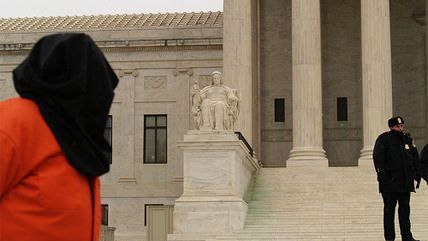This Is What Happens When You Fear Free Speech
The Obama administration is undermining our most basic rights.

Perhaps these Obama administration scandals (popularly referred to as "so-called scandals" in liberal media circles) lack the explosive drama of a Watergate and the entertainment value of Bill Clinton's peccadilloes, but for those who are less obsessed with the political consequences and more troubled by constitutional fallout, there's plenty to see.
To begin with, the Internal Revenue Service scandal isn't just about the abuse of power; it's a byproduct of an irrational fear of free speech, which seems to permeate much of the left these days. The unprecedented targeting of conservatives wasn't incidental to this administration as much as it was an intuitive extension of the paranoia the left has about unfettered political expression.
Democrats, after all, hadn't been merely accusing political opponents of being radical twits the past four years; they'd been accusing them of being corrupt, illegitimate radical twits. The president endlessly argued that these unregulated groups were wrecking the process at the behest of well-heeled enablers rather than engaging in genuine debate.
Heck, some of these funders may even be foreign nationals! Senators called for investigations. Obama called out the Supreme Court during a State of the Union speech for defending the First Amendment in the Citizens United case (which prohibits the government from restricting political independent expenditures by groups). The New York Times editorial board (and others) advocated the cracking down by the IRS on conservative dissenters and getting to the bottom of the anarchy.
How can Americans function in a society in which anyone can speak out or fund a cause without registering with the government first?
Why wouldn't the IRS -- a part of the executive branch, lest we forget -- aim its guns at conservative grass-roots groups during an election in which the president claimed that a corporate Star Chamber was "threatening democracy"? Come to think of it, I'm still not sure why the president believes that it was wrong of the IRS to single out limited-government groups for their tax-exempt status at all. He couldn't stop talking about the topic for two years.
Even if we concede, for the sake of discussion, that Republicans are, generally speaking, unrepentant conspiracy-mongering obstructionists who've been duped by Ayn Rand devotees and their big oil money, shouldn't those groups have the right to pretend to be nonpolitical entities practicing "social welfare" just like everyone else? Most observers now say yes, but it sure hasn't sounded that way for much of the past four years.
You may also remember that back in 2009, the administration was so preoccupied with Fox News (the only news network one could reasonably call the opposition) that top-ranking administration officials -- including Anita Dunn, Rahm Emanuel and David Axelrod -- made a concerted effort to delegitimize its coverage. This was also unprecedented. Not long after that effort, Attorney General Eric Holder decided to spy on a Fox journalist who was reporting on leaks -- shopping his case to three separate judges, until he found one who let him name reporter James Rosen as a co-conspirator in a crime of reporting the news.
When Sen. Dick Durbin, D-Ill., was asked about the possibility of passing a media shield law to curb this sort of abuse in the future, he replied, in part: "We know it's someone who works for Fox or AP, but does it include a blogger? Does it include someone who's tweeting? Are these people journalists and entitled to constitutional protection?" In the shadow of these attacks, the Senate majority whip is troubled that there may be too many protections for speech rather than too few. That is quite remarkable -- and, these days, quite unsurprising.


Show Comments (310)